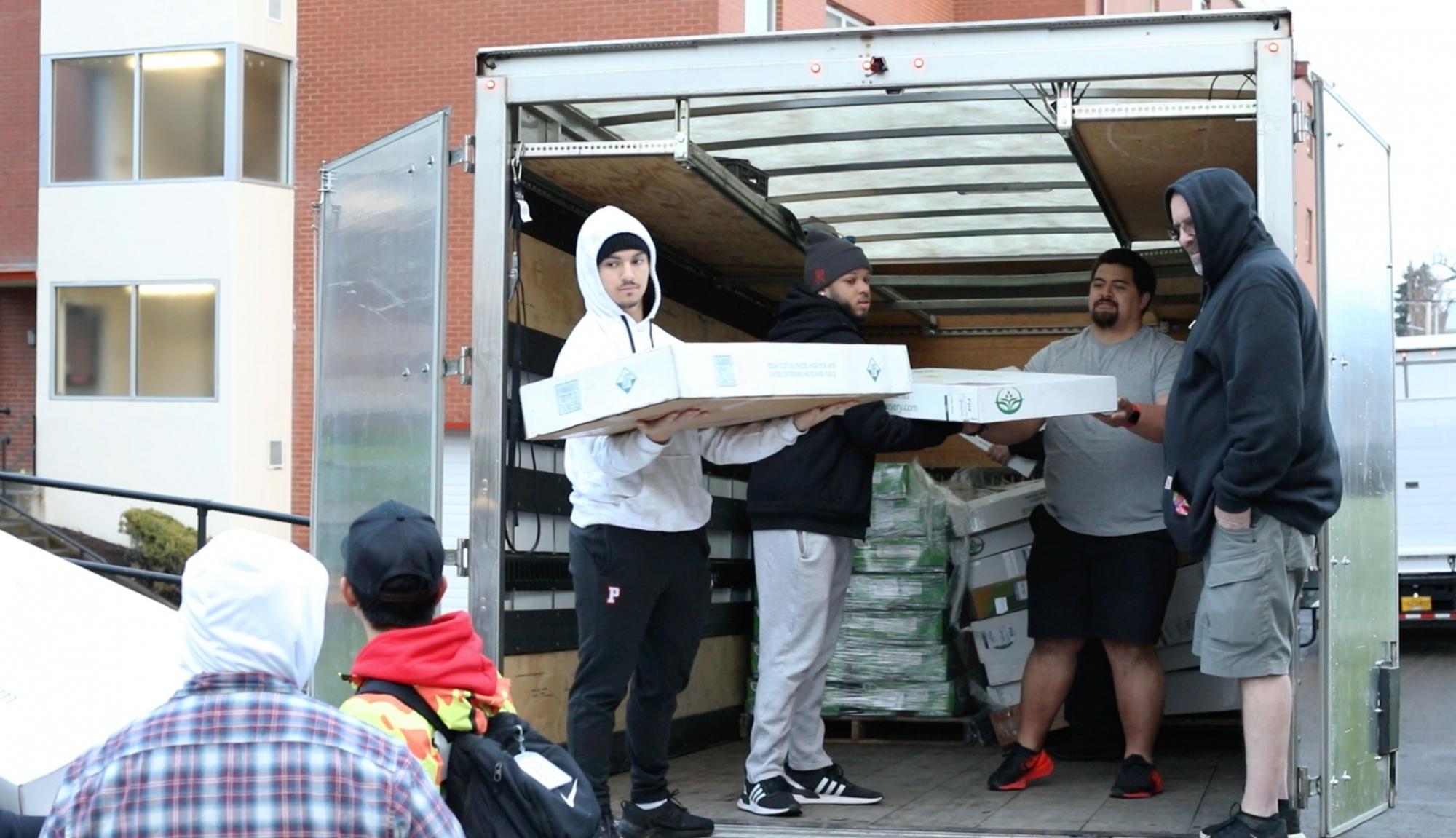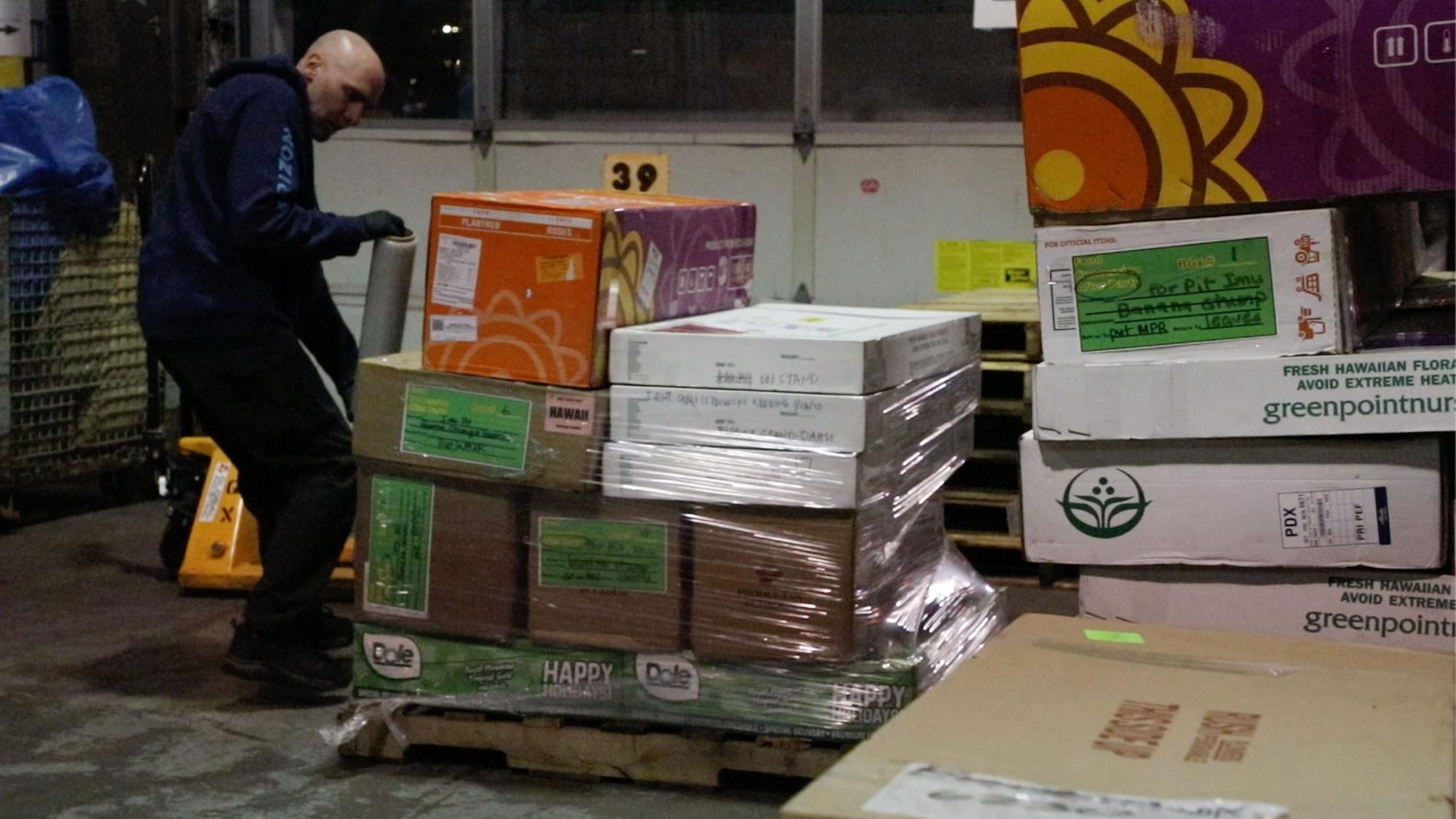Country Store Brings Tastes, Scents Of Hawaiʻi To Community
 The smell of fresh flowers being sewn into leis. The taste of fresh pineapples. The sound of Hawaiian music that makes time slow down.
The smell of fresh flowers being sewn into leis. The taste of fresh pineapples. The sound of Hawaiian music that makes time slow down.
For many who attend Pacific University’s annual Nā Haumāna O Hawaiʻi (NHOH) Lūʻau and Hōʻike, the first experience of this spectacle for the senses is not during the hallmark show or dinner, but as part of a marketplace of island favorites in the Stoller Center’s lobby.
The Country Store gives attendees of Lūʻau and Hōʻike, as well as the general public, a chance to take a taste of the islands home, whether in the form of fresh produce or flowers, island crafts, or a new Aloha shirt.
Mahina LaBoy ’24 and Kalen Kobashigawa ’24, the student co-chairs for the 2024 Country Store, said the market aims to bring to the mainland items that are normally only available in the islands.
“Macadamia nuts are really popular,” LaBoy said. “So are a lot of the candies. You can get Li Hung Mui candies in Oregon, but we bring in products that are usually better quality and brands that students prefer from home.”
“We get a lot of fresh produce, like pineapples,” said Kobashigawa, who is from Kapahulu on the island of Oʻahu. “The Punaluʻu bread is really popular. We also have the Aloha Shoyu sauces, which they do sell in Oregon, but we like to price them a little cheaper so they are more affordable.”
In addition to food and produce offerings, the Country Store also sells books, flowers, household items and apparel from the islands and produced locally for NHOH, which hosts one of the largest student-organized and student-produced lūʻaus in the United States.
Produced annually since 1960, the Lūʻau and Hōʻike celebrates the culture of Hawaiʻi and other Polynesian islands that have become a key part of the culture at Pacific University. Between 17 to 20% of first-year undergraduate students at Pacific come from Hawaiʻi. Including students, Pacific is connected with more than 6,700 people in the state.
While the show and dinner are the focal points of Lūʻau and Hōʻike, students involved with the Country Store say it is another way to celebrate and educate people about the rich culture of Hawaiʻi and other Polynesian islands.
“With each individual snack, we share all of the different cultures that are within Hawaiʻi. It’s a very complex community,” said Mya Manzo ’24, one of NHOH’s donation committee co-chairs.
“We are not just sharing the culture of dance, but also sharing the culture of the foods and the crafts with the community,” said LaBoy, who is from Kaneohe on the island of Oʻahu. “I have always been into my Hawaiian culture, but being a part of Lūʻau and Hōʻike, and the Country Store, has made me more passionate about it.”
Like nearly every part of the Lūʻau and Hōʻike, the process of bringing the Country Store together is a year-round effort. Donation chairs send letters and emails to businesses on the islands in November. As donors respond, the donation chairs track responses and work with parent volunteers on each island to gather donations on Oʻahu to be shipped to Forest Grove.
 Merchandise arrives at Portland International Airport early in the week of Lūʻau. Students arrive at the airport before daybreak for Cargo Days, when they inventory donations and load items into vehicles for transport to the Forest Grove Campus.
Merchandise arrives at Portland International Airport early in the week of Lūʻau. Students arrive at the airport before daybreak for Cargo Days, when they inventory donations and load items into vehicles for transport to the Forest Grove Campus.
Manzo, who is from Waikoloa on the island of Hawaiʻi, said that solicitations for donations were sensitive to the continued efforts to help people recover from the devastating fires on Maui over the summer. “We politely asked, but we didn’t want to ask for too much,” she said. “We send thank yous and show gratitude even if they don’t decide to donate.”
Once on campus, student workers turn much of the preparation of the store over to an army of parents, both from the local area and from Hawaiʻi. The parents work to price items, stock shelves and tables, and make sure everything is ready to go.
Without the parents, LaBoy said, the Country Store and many other aspects of Lūʻau and Hōʻike couldn’t happen. With nearly every member of NHOH involved in the Lūʻau show itself, the involvement helps to spread the load.
“My dad hangs out in the inventory room, and he and my uncle bring all of the items out,” said LaBoy, who is instructing three dances for this year’s Lūʻau and dancing in a fourth. “My mom and my auntie always work the credit card booth. We do a lot, but I think the parents are what really holds the Country Store together.”
“Our parents are doing everything behind the scenes and making sure that it all comes together how we want it to go,” said Kacyn Ideue ’26, donation committee co-chair. “They’re making sure all of the I’s are dotted and T’s are crossed.”
While the Country Store has been a part of Lūʻau and Hōʻike for decades, there always seems to be something new that keeps people coming back year after year.
“Last year it was One-Ton cookies,” Manzo said. “They are cookies with little wonton crackers in them. They are from Hilo. They were a new item and lots of people bought them.”
“I’m looking forward to the snacks and the Li Hung Mui candies,” Ideue said. “I am looking forward to having a sweet treat.”


